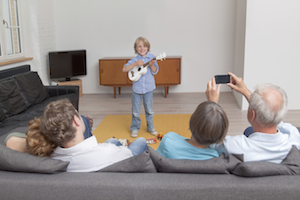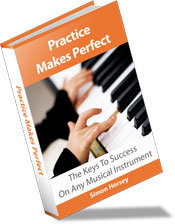Encourage performance

You should encourage performance because nothing gets students practicing like an upcoming performance, especially if it is in front of their friends or peers!
It is unlikely there will be opportunity to perform in big concerts on a regular basis but it may be possible for your son or daughter to put themselves forward to play in a school assembly, a church group or other local community event. The more performances they are involved in, the better.
Having a smaller, informal concert is just as beneficial to encourage performance. This could be an hour or so long to parents and friends of the performers in the school music room, or even in somebody’s house if there is a big enough room. If the instrumental teacher is available maybe he or she could be enrolled to give a short, supportive comment after each student has played. This could also be a suggestion to give to school music teachers if the school has nothing similar. As well as giving students something to aim for these informal evenings allow them to practice performing, making them less nervous about playing in front of people. Performance is the same as other areas of music: Practice Makes Perfect!
One of the benefits of smaller, informal concerts is that more can be organised throughout the year. This means students who have pieces that are ready for performance may be invited to play, and those just starting on new pieces know that their chance will come soon. Playing in too many concerts can be detrimental to progress, even though they encourage performance. Sometimes students can spend too much time polishing pieces for performance, when a particular technique has been mastered to an acceptable level, but not a performance level. Instead of polishing a piece for performance it would be more beneficial to the student to move on to a new piece and build on their technique.
Encourage performance to
family and friends
If you or the teacher can’t organize a small concert there is nothing to stop you inviting family and friends to hear some music. Don’t spring this on the student without warning though. There is nothing worse than having an impromptu performance sprung on you, especially to family and close friends. If the student decides to play to the assembled company without rehearsal - fantastic! If not - don’t push. Saying "Oh why don't you come and play, I'm sure Auntie Ethel would love to hear you perform" without warning does not encourage performance. One of the worst things that can happen to a young performer is to have to play in front of people without preparation or warning. A negative performance experience when you are young can affect your performances for many years to come. Warn them before. Let them know who will be there, aunts, uncles, cousins etc. and that you would like them to play a couple of short pieces. You are, after all, very proud of their achievements. Give them notice. It doesn’t even have to be optional... but don’t push them to do too much. Don’t let the assembled company get bored and figety. Remember: this is your child... not theirs! You need enough for them to say “Wow! That was great! Can’t wait to hear some more next time” and not enough for long sighs and whispers of “How much longer is this going on?” If in doubt, talk to the teacher. Try to make it a bit of an occasion though, as this adds to the slight pressure on the performer and that is something they need to practice playing with!
If it all goes wrong...
Don’t criticize after a performance... unless you could do better when you were that age... and even then, it is better not to. We are all fully aware when we have turned in a less than brilliant performance and it doesn't encourage performance for the future. Allow the student time to reflect and to self evaluate. Don’t say “What happened? You were so good the other day!” This is not helpful! And never, ever say “I feel so embarrassed” because there is no way that anything you are feeling is as bad as what the student is feeling!
When he or she has calmed down talk about it. Ask what went well, and what didn’t. Ultimately the performer has to take responsibility of things went wrong - but it shouldn’t turn them off from music forever!
If appropriate, count the number of notes in the piece, and in the part that went wrong. It is often just a couple of bars that fall apart, but to the performer it seems as if the whole piece was terrible. Focus on the positive. Ask how the things that went wrong can be fixed for next time. If they are upset, support them, but gently remind them that the world is still turning and 6 billion people didn’t even hear their mistakes!
Encouragement for
the next performance
After each performance talk about how to make the next one even better.
Talk about practice, direct students to the Music Practice Games section of this site
where there is an ever growing list of practice games to help encourage
performance. Subscribe to the Perfect Practice newsletter and use the
practice tips each month to keep practice techniques fresh and
interesting. Be involved and listen to their practice. Praise the effort being made. Applaud loudly at all concerts!
Expert Practice Secrets
Frustrated with your practice? Read Practice Makes Perfect and hack the 10,000 hour rule. Cut your practice time by up to 25%! Make faster progress, learn pieces and scales faster, memorize more easily, and much more. "If you play an instrument you need this book!"
Recent Articles
-
How To Speed Up Scales and Improve Accuracy
Oct 13, 24 04:23 AM
How to speed up scales is something many people want to know, but speed should also come with accuracy. Read on to find out how to do both. -
From an opera singer, on her death bed to Leonard Bernstein
Jan 29, 24 03:36 PM
I enjoy reading the music more than hearing it. From an opera singer, on her death bed to Leonard Bernstein -
unknown
Jan 29, 24 02:52 PM
Not happy with your tone? Practice more.

New! Comments
Have your say about what you've just read!Leave me a comment in the box below.